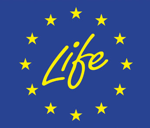
Nirvana is a European project co-funded by the LIFE Programme aiming to address the environmental problem of groundwater pollution by developing an innovative, effective and sustainable technology for in-situ remediation of aquifers contaminated with nitrates.
Nitrates are ions consisting of three oxygen atoms, one nitrogen atom and with a negative charge (NO3-). They have no colour or taste and are found in nature dissolved in water. Their natural presence in surface or groundwater is a consequence of the natural nitrogen cycle. However, in certain areas, there has been an alteration of this cycle. In other words, there has been an increase in the concentration of nitrates, mainly due to the excessive use of nitrogenous fertilisers and their subsequent dragging by rainwater or irrigation.
Nitrates can be produced by both natural and anthropogenic sources, the latter being responsible for the significant increase in their concentration observed in recent years.
There are currently several techniques for the elimination of nitrates in water. These can be classified into two groups:
The first techniques are currently the most widely used for the treatment of natural waters polluted by nitrates. Although they give very good results, they are expensive and do not solve the problem, as they do not transform the nitrate into a harmless compound. Rather, they generate a brine concentrated in nitrates, with no economic value and which must be treated or stored appropriately.
Regarding transformation techniques, biological processes are currently widely used in wastewater and industrial water treatment and are incorporated in many treatment plants, giving very satisfactory results. However, this technology, although suitable for wastewater, cannot be used for drinking water treatment due to the possible bacterial contamination of the treated water and the presence of organic residues after water treatment.
The LIFE Nirvana project proposes an innovative, sustainable and environmentally friendly method, which can be considered as a transformation technique, based on the controlled injection of small quantities of nanoparticles of zero-valent iron (Fe0) into the aquifer. The aim of this technique is to encourage the activity of denitrifying bacteria naturally present in the aquifer by establishing a reducing and anaerobic medium. These bacteria can transform the nitrate dissolved in the water into harmless gaseous nitrogen (N2).
This biological denitrification process allows the net elimination of nitrogen (NO3) in the environment without generating any waste or negative impact on the aquifer.
This European research project aims to restore the good chemical state of groundwater bodies so that it complies with the parameters imposed in terms of the number of nitrates and thus increase the volume of groundwater available for human consumption.